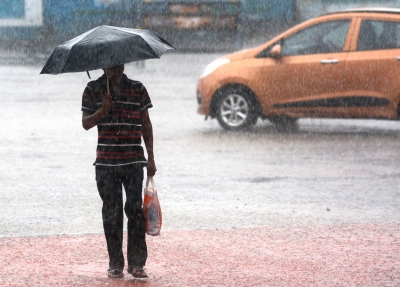Famine situation in West Bengal feared as rainfall deficit rises
By IANS | Published: August 2, 2022 07:42 PM2022-08-02T19:42:05+5:302022-08-02T20:00:18+5:30
Kolkata, Aug 2 With rainfall deficit in West Bengal being recorded above 45 per cent in two consecutive ...

Famine situation in West Bengal feared as rainfall deficit rises
Kolkata, Aug 2 With rainfall deficit in West Bengal being recorded above 45 per cent in two consecutive months of June and July, the state Agriculture Department apprehends a famine-like situation unless there is enough rainfall in August to partially cover up the shortfall.
According to the records of the state Agriculture and the Irrigation Departments, while the rainfall deficit had been recorded at 48 per cent in June, the figure came down slightly to 46 per cent in July. Veterans in the state Agriculture Department said that last time when such a severe rainfall deficit was witnessed in West Bengal was in 2010, though it never went over 40 per cent.
According to agriculture expert and All India Kisan Sabha leader, Samar Ghosh, generally the time for sowing of Aman paddy is from middle of July to middle of August. Unless there is enough rainfall during that period, the seed-beds do not become suitable for sowing of seeds, he added. So, according to him, there is a possibility of a major delay in the beginning of the sowing period which will hamper the production to a great extent.
As per the statistics of the state Agriculture Department till the middle of July, sowing of paddy seeds had been possible in only 2.08 lakh hectares out of the target of 52 lakh hectares.
Again, out of 2.08 lakh hectares of land, sowing of Aus paddy has been possible for 1.1 lakh hectares, thus posing grave uncertainty for production of this particular variety of paddy during the current farming season. On the other hand, till date, Aman paddy can be sown in 97,000 hectares of land.
What has really kept the state Agriculture Department worried is the rate of sowing in East Burdwan district, which is traditionally considered West Bengal's granary.
Professor of Economics, P.K. Mukhopadhyay said that the factor will inevitably result in an increase of rice in the open market in the coming days as it happened in 2010. "At the same time, the worst affected will be the sharecroppers and as many of them will become jobless," he said.
Admitting that the situation is critical, Principal Agriculture Advisor to the state government, P. Majumdar said that they are keeping a watch on the entire situation and all remedial measures that the probable losses do not affect the lives of the farmers.
Disclaimer: This post has been auto-published from an agency feed without any modifications to the text and has not been reviewed by an editor
Open in app